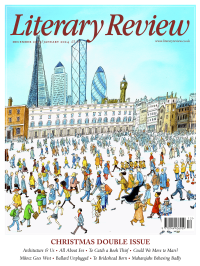Frances Wilson
Minor Miracles
Minor literary figures have always attracted me because the designation is so terminal: once a minor always a minor, unless elevated to a major minor. On my bookshelves are the three fat volumes of George Saintsbury’s Minor Poets of the Caroline Period, in which the reputation of poor Shackerley Marmion (1603–39) is written in stone. How can he ever regain his dignity?
No man, except J Alfred Prufrock (‘No! I am not Prince Hamlet, nor was meant to be’), is minor in his own estimation. A minor character in a major poem, Prufrock, ‘an attendant lord’, is the patron saint of all his kind: mock-heroic, comi-tragic, aware of his speck-like significance:
Deferential, glad to be of use,
Politic, cautious, and meticulous;
Full of high sentence, but a bit obtuse;
At times, indeed, almost ridiculous –
Almost, at times, the Fool.
A minor poet is not, of course, the same as a minor character. Nor is a minor poet the same as a failed poet, or a minor poem always the work of a minor poet. T S Eliot was a major poet who included, in his collected poetry, a section of ‘minor poems’. When asked by Donald

Sign Up to our newsletter
Receive free articles, highlights from the archive, news, details of prizes, and much more.@Lit_Review
Follow Literary Review on Twitter
Twitter Feed
Princess Diana was adored and scorned, idolised, canonised and chastised.
Why, asks @NshShulman, was everyone mad about Diana?
Find out in the May issue of Literary Review, out now.
Literary Review - For People Who Devour Books
In the Current Issue: Nicola Shulman on Princess Diana * Sophie Oliver on Gertrude Stein * Costica Bradatan on P...
literaryreview.co.uk
Under its longest-serving editor, Graydon Carter, Vanity Fair was that rare thing – a New York society magazine that published serious journalism.
@PeterPeteryork looks at what Carter got right.
Peter York - Deluxe Editions
Peter York: Deluxe Editions - When the Going Was Good: An Editor’s Adventures During the Last Golden Age of Magazines by Graydon Carter
literaryreview.co.uk
Henry James returned to America in 1904 with three objectives: to see his brother William, to deliver a series of lectures on Balzac, and to gather material for a pair of books about modern America.
Peter Rose follows James out west.
Peter Rose - The Restless Analyst
Peter Rose: The Restless Analyst - Henry James Comes Home: Rediscovering America in the Gilded Age by Peter Brooks...
literaryreview.co.uk